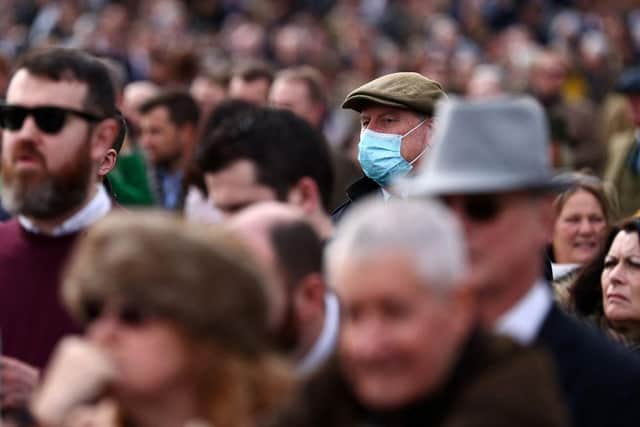Covid Scotland: Face mask rule easing welcomed by deaf community but many remain cautious
The Royal National Institute for Deaf People (RNID) said many people it represents will be pleased when the rule is scrapped for weddings, funerals and worship on Monday, and in wider settings on April 18.
“While we should all continue to be careful and act responsibly, being able to see lip patterns and facial expressions is essential and face masks have made communication challenging, and sometimes impossible, for the one in five adults who are deaf or have hearing loss in Scotland,” said Roger Wicks, RNID associate director for policy.
Advertisement
Hide AdAdvertisement
Hide AdThe move has also been welcomed by some people with dementia and their loved ones, while others remain cautious.


Jim Pearson, Alzheimer Scotland Director for Policy and Practice, said: “Some people are welcoming the legislation change in April - there is no doubt that face coverings limit communication, with so many people with dementia relying on facial expression for prompts, reassurance and comfort.
"We have heard from families visiting their loved ones who live in Scotland’s care homes how devastating it has been to have such barriers, particularly when the rest of society can spend time together in their own homes, bars and pubs without face coverings.”
But Mr Pearson added: “Conversely, we know how anxious people with dementia and their families and carers are about attending groups, places of worship, shops etc at a time when regulations are relaxing yet infection rates are continuing to soar.”
Scots who are immunosupressed or otherwise vulnerable have said they feel ignored by the change in rules.
Martin Purchase, 67, has advanced Parkinson's disease and is concerned about getting seriously ill if he catches Covid.
He and his wife Fiona said they are “extremely alarmed” by the rule change, and that it seems “ludicrous" given current record-high Covid infections and hospitalisations.
"There is no way that we would feel confident about being in indoor public spaces if people are walking about without the most basic, easy-to-use and effective public protection there is,” they said.
Advertisement
Hide AdAdvertisement
Hide Ad"So many will interpret the ending of the mandate as a signal that face coverings are no longer needed. Guidance really is not sufficient.
"It really feels as if people more vulnerable to Covid are being completely disregarded.”
Jo Nove, Acting Chief Executive at blood cancer charity Myeloma UK, said: “Relaxing the rules on face masks will cause huge anxiety for immunocompromised people, who will no doubt feel left behind as the rest of the world moves forward."
She added: “Our concern is that without compulsory mask-wearing and testing many will feel they have little choice but to return to some form of shielding and limit their contact with others.
Clinically vulnerable patients should not be treated like second-class citizens. They deserve to feel safe, listened to and protected.”
Mr Wicks added: “For those members of the public who want or need to continue to wear a face mask, we would urge them to follow our straightforward communication tips and to use a transparent mask or lower their mask if they’re talking to a deaf person or someone with hearing loss.”
A message from the Editor:
Thank you for reading this article. We're more reliant on your support than ever as the shift in consumer habits brought about by coronavirus impacts our advertisers.
If you haven't already, please consider supporting our trusted, fact-checked journalism by taking out a digital subscription.
Comments
Want to join the conversation? Please or to comment on this article.
